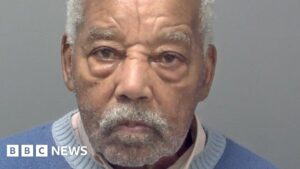
LONDON (AP) — The BBC is under fire for broadcasting a controversial performance by rap duo Bob Vylan at the Glastonbury Festival, where the group led chants deemed “antisemitic” by the broadcaster. The performance, which took place on June 28, 2025, featured chants calling for “death” to the Israeli military, drawing widespread criticism.
The British broadcaster acknowledged on Monday that it should have pulled the livestream, stating, “The antisemitic sentiments expressed by Bob Vylan were utterly unacceptable and have no place on our airwaves.” This statement followed a wave of condemnation, including from British Prime Minister Keir Starmer, who described the chants as “appalling hate speech.”
BBC’s Response and Regulatory Concerns
In its defense, the BBC noted that it had issued an on-screen warning about “very strong and discriminatory language” during the livestream. However, this has not quelled the criticism. Ofcom, the UK’s broadcasting regulator, expressed concern, stating that the BBC “clearly has questions to answer” regarding the decision to air the performance.
The Israeli Embassy in the UK also expressed its dismay, describing the rhetoric at the festival as “inflammatory and hateful.” The embassy’s reaction highlights the broader geopolitical sensitivities surrounding the event.
Bob Vylan’s Controversial Performance
Bob Vylan, formed in 2017, is known for its provocative lyrics addressing issues like racism and politics. The duo’s performance at Glastonbury, one of the UK’s largest music festivals, included chants of “free, free Palestine” and “death, death to the IDF,” which have been at the center of the controversy.
In a social media statement, Bobby Vylan, one of the duo’s members, responded to the backlash, saying he received a mix of support and criticism. “Teaching our children to speak up for the change they want and need is the only way that we make this world a better place,” he wrote.
Political and Social Context
The performance comes at a time of heightened tensions in the Middle East. Israel has faced international criticism for its military actions in Gaza, with countries like the UK, France, and Canada calling for an end to what they describe as “egregious” actions. The ongoing conflict has sparked global protests, with pro-Palestinian demonstrations occurring in many cities.
More than 6,000 people have been killed and over 20,000 injured in Gaza since the ceasefire collapsed in March. The conflict has resulted in over 56,000 deaths and 132,000 injuries since October 2023, according to Gaza’s Health Ministry.
The war has polarized public opinion, with Israel’s supporters labeling the protests as antisemitic, while critics argue that these accusations are used to silence dissent.
Implications and Future Actions
The BBC’s handling of the incident raises questions about the responsibilities of broadcasters in moderating content that could incite violence or hatred. The debate over freedom of expression versus the need to prevent hate speech is likely to continue, with regulatory bodies like Ofcom playing a crucial role in setting future guidelines.
Meanwhile, law enforcement is reviewing video evidence from the festival to determine if any legal actions are warranted. The controversy surrounding Bob Vylan’s performance underscores the complex interplay between art, politics, and media in today’s interconnected world.
As the situation develops, the BBC and other broadcasters may need to reassess their policies to navigate the challenges of live event coverage in politically sensitive contexts.






